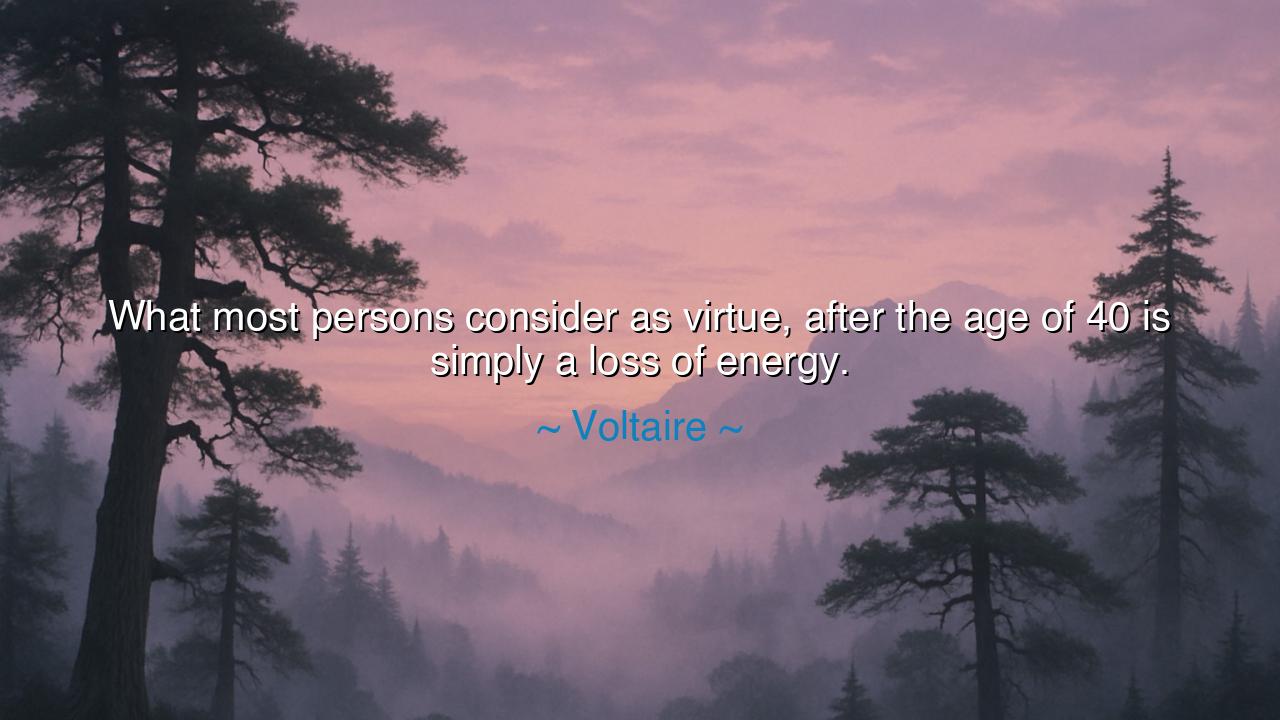
What most persons consider as virtue, after the age of 40 is






Gather closely, O seekers of wisdom, and listen to the words of Voltaire, for they carry with them a truth that many of us may hesitate to face: “What most persons consider as virtue, after the age of 40 is simply a loss of energy.” These words speak of the illusion that virtue is something that remains unchanged with the passage of time, while in truth, it is energy, that driving force of life, which begins to ebb as the years go by. Voltaire's insight challenges us to understand that the vigor and passion of youth, which we once saw as virtuous, gradually morph into something else as we age—not because of the loss of moral character, but because the life force itself begins to shift its focus, transforming how we engage with the world.
In the days of the ancients, the philosophers spoke of the human journey as one of stages, each filled with its own challenges and virtues. Socrates, who spent his days in questioning and debate, believed that the pursuit of virtue was the highest calling of life. However, as he grew older, Socrates, like all the wise men of the past, recognized that the body eventually becomes less willing to serve the spirit’s boundless will. The energy that once propelled him into the streets of Athens to challenge others began to wane, and in its place, he found a deeper reflection, one that relied less on action and more on contemplation. Socrates did not lose his virtue in the physical sense, but his energy to engage in endless physical discourse diminished, as Voltaire’s words might suggest, because of the natural decline of vitality.
Consider the example of Plato, Socrates' student, who in his later years withdrew from public life. Plato, like Socrates, understood that the energy of youth does not last forever. In his middle and later years, he dedicated himself more to writing, to capturing the truths of life not in the vibrant debates of the agora but in the silence of his studies. For Plato, the virtue of his later years was not in active conquest or public dialogue but in the reflection and wisdom that come with age. Here, Plato provides a profound insight: virtue changes form with the passing of time—not necessarily because it weakens, but because the body’s energy wanes and the spirit seeks a deeper, more contemplative engagement with the world.
Voltaire's words also invite us to examine the modern myth that youthful vigor is synonymous with virtuous living. Many in our world continue to glorify energy as the hallmark of goodness, of strength, and of success. We see this in the young warriors of society—those who are praised for their accomplishments, their energy, and their drive. But as Voltaire wisely reminds us, after the age of 40, these very qualities that were once celebrated become less visible, not because the spirit has changed, but because the vital force that sustains the body has shifted. The energy that once led to action and outward pursuits now turns inward, toward the wisdom and deeper understanding that only age can bestow.
Look to the life of Benjamin Franklin, who, though he lived an energetic and adventurous youth, found in his later years a new form of virtue—one that was not driven by the rapid pace of his earlier days. By the time he reached middle age, Franklin had moved from his fiery years of experimentation, invention, and political action into a more reflective, yet equally influential, role. His writings, particularly his later work on morality and virtue, reveal a man who had shifted his focus from the exuberance of youthful discovery to the calm wisdom that came with age. Franklin’s life embodies Voltaire's wisdom: that true virtue is not always in energetic action but in steadfast commitment to one's inner values, even as the energy for external action fades.
The message of Voltaire is one of understanding and acceptance—accepting that as we age, our virtue will often take on new forms. The energy to act, to move quickly, to grasp at fleeting desires may lessen, but the strength of wisdom, reflection, and inner peace grows. Virtue becomes less about external accomplishments and more about the quality of one's character, the depth of one’s understanding, and the ability to influence the world through more subtle, introspective means. It is a deeper strength, one that comes not from the exhilaration of youth but from the calm mastery of one’s own soul.
Thus, the lesson for us is clear: do not mourn the decline of energy, for it is part of the natural cycle of life. Instead, embrace the change. Recognize that your virtue will evolve, that it will take on new forms as you age, and that this shift is not a loss, but a gain. Just as Socrates and Franklin found deeper meanings in their later years, so too can you find new ways to express your wisdom, your understanding, and your influence on the world, even as the physical vigor of youth fades. The energy of your youth may wane, but your spirit remains ever potent, if you know how to channel it.
In your own life, prepare for the change that comes with age. Recognize that virtue is not tied to action alone, but to the quality of your inner life. Allow yourself to embrace the new forms of strength and wisdom that age will bring, and in doing so, you will find that the loss of energy is not something to fear, but something to accept with grace.






AAdministratorAdministrator
Welcome, honored guests. Please leave a comment, we will respond soon